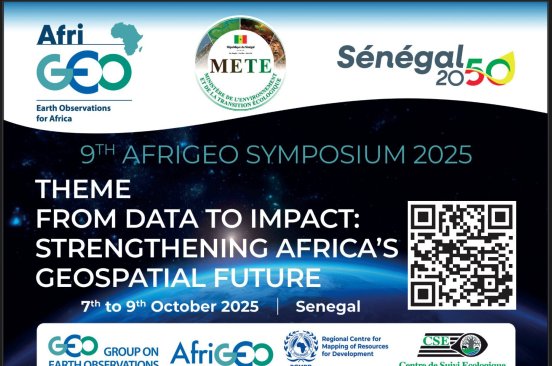
‘Build–Fly–Pitch’: Papua New Guinea Flying Labs Promotes Teamwork Training at ' Hack4Change'
The building, flying, and pitching in teams enabled the hackers and their mentors to work collaboratively to build a prototype or complete a flight mission.
August 11th, 2020
By Papua New Guinea Flying Labs
Papua New Guinea Flying Labs was engaged by the Papua New Guinea ICT Cluster (ICT) to run a 'team-building with drones' exercise on July 25th, 2020. The inaugural Hack4Change event in Port Moresby was an energy booster to supercharge 34 participants before they launched into their computer programs, prototypes, and pitch decks. The outcome was successful, and we are looking forward to working in synergy with the ICT Cluster.
"On behalf of the PNG Digital ICT Cluster Board, we would like to sincerely express our gratitude for your great support to our Inaugural Hackathon program and look forward to promoting a partnership in the future in our Hackathon development activities as our pioneer Team Building mentors." – PNG Digital ICT Cluster to Papua New Guinea Flying Labs.
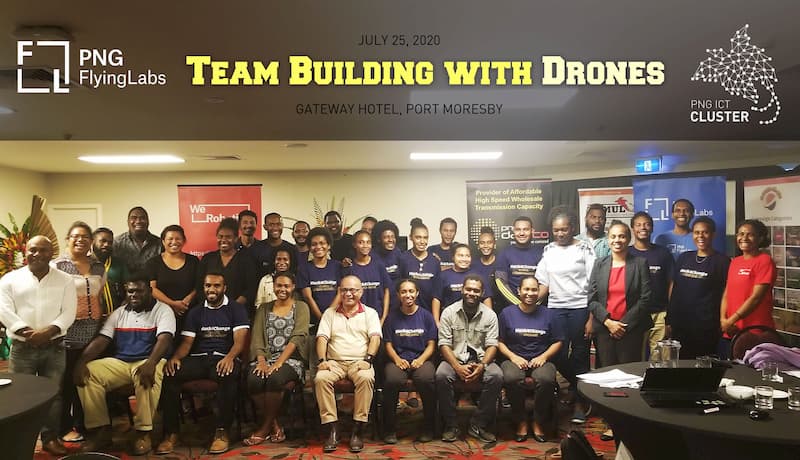
We share the vision of the ICT Cluster to shape our nation's talent pool and innovation ecosystem. Our work supports explicitly UN Sustainable Development Goals (SDG) 3 (Good Health and Wellbeing), 8 (Decent Work and Economic Growth), 9 (Industry Innovation and Infrastructure), and 10 (Reduced Inequalities). The Hack4Change event is all-inclusive, where hacking teams applied through a formal registration process to qualify to participate. Seven hacking teams, each with four members, were selected for the hackathon from July 24 - 27 and focused on SDG 2, 4, 5, 12, and 16. Of the 28 participants, 50 percent (14) were female, and each team had at least one female.

Crysan CEO & Chief Technical Officer Crystal Kewe was the Keynote Speaker. The winner of APEC PNG's 2018 App Challenge and the 2018 Digital Prosperity Award, Kewe challenged the participants with her theme to "Embrace Your Talent – Be the Problem Solver Today!" This event brought together policymakers, researchers, practitioners, and telecommunication companies to participate in the startup ecosystem's development to champion progress and investment. Throughout the hackathon, local mentors, Ernie Gangloff, Christopher Vagalia, Leonard Wanusim, John Pora Chambers, and Dr. Clement Waine, technical consultant for Papua New Guinea 2020 STEM Education Policy shared their business experiences and best practices in the ICT industry. They challenged the hacking teams to be creators of technology to solve everyday problems and drive the economy. It was a bonus of having Happymabel Ketias-Zingunci, a Zimbabwean certified ethical hacker as a guest mentor and judge at the event.
"Teamwork divides the effort and multiplies the effect." – Edwin Louis Cole
So, where does our team-building exercise come in? From 2015 to 2017, we participated in two cohorts with 80+ participants in the Kumul GameChangers pioneering startup program in Papua New Guinea. Through week-long boot camps led by Silicon Valley mentors, we learned about lean business models, building fast and straightforward prototypes, testing our target market through face-to-face interviews, pitching to potential investors, and building viable and scalable solutions. A key component we learned from our journey was the power of teamwork. As the basis of our team-building exercise, we demonstrated the importance of utilizing different skillsets: hackers (technology), artists (storytelling), and hustlers (sales).
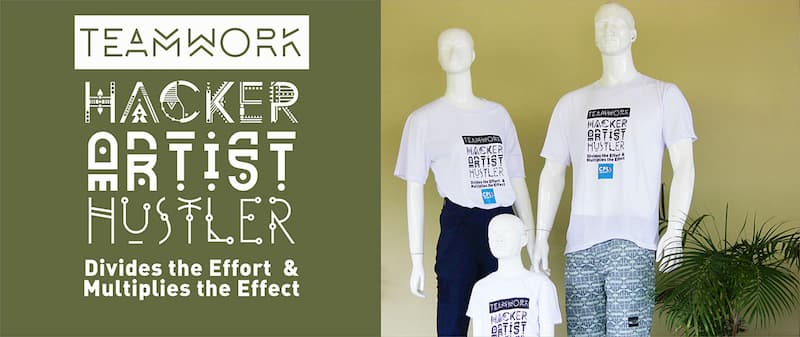
Early Saturday morning on July 25th, we supercharged the 34 participating hackers and mentors before they ran their problem-solving algorithms for the next 48 hours. As an ice-breaker, we gave the hacking teams a one-page baseline survey to capture their understanding of drone technology, Papua New Guinea's drone rules and regulations, and the consumer drone market. We also shared why we are in the drone space by addressing: (1) What are drone technology and drone safety? (2) How do we use drone technology? And (3) Benefits of drone technology.
Finally, we randomly divided the 34 participants into three groups. Each group of 11-12 members was assigned to build, fly, or pitch stations in the training room. Once stationed, we introduced their roles and importance to the outcome or product. We gave them two minutes for mental preparation before they were tasked to build a drone, fly a mini drone in a predefined path, or prepare a sales pitch to sell a drone (or drone-related hardware or software) in just 10 minutes. We timed each activity and, upon its completion, asked each group to share their learning experiences and showcase their masterpieces under two minutes. It was fun to see how teams were creative and resourceful with limited time and materials. All the teams completed the three stations within 40 minutes.
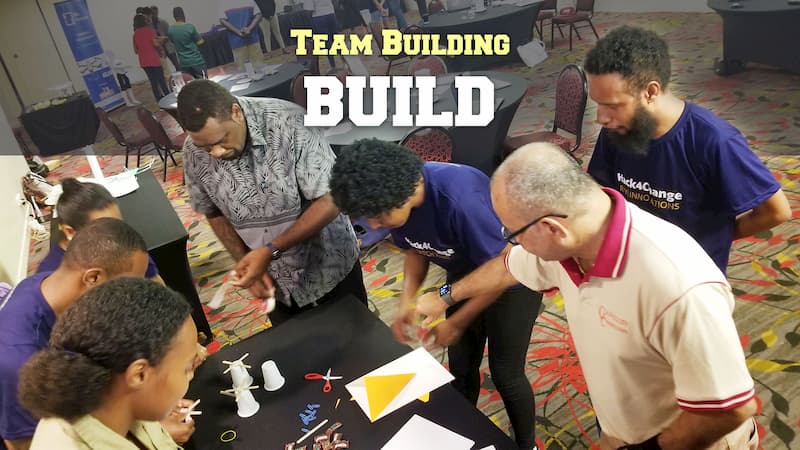
The first station is BUILD. Teams identified a specific problem in PNG to be addressed by cargo drones. They used simple craft items to showcase the structure and function of their drones to solve the problem. Upon completion, the team presented the drone and highlighted the drone hardware and software's technical capabilities and how they would support a drone operation.
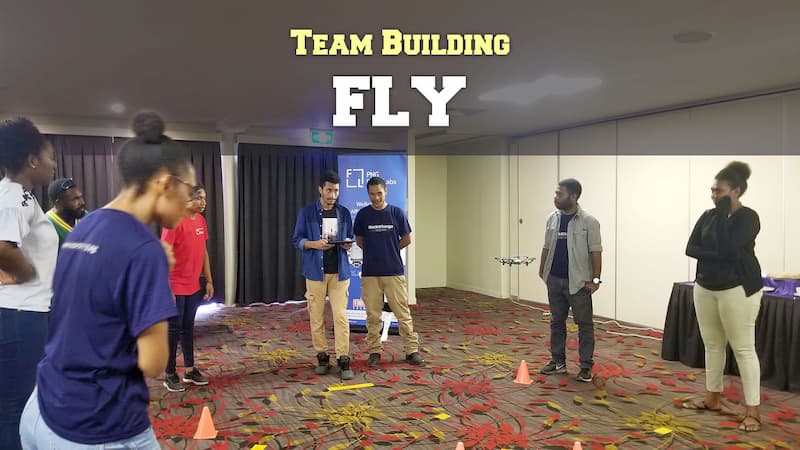 Station 2: FLY (Drone Operation)
Station 2: FLY (Drone Operation)
The second station is FLY. Before teams took their first flights on a predefined path, we briefly demonstrated the basic drone maneuvers (up, down, forward, backward, left, right, turning clockwise/counter-clockwise) and drone safety. We also highlighted the importance of the roles of 1) a pilot in command (PIC), 2) a visual observer (VO), and 3) a recorder. The PIC flies the mini drone; the VO assists the PIC with situational awareness while the recorder documents the mission.
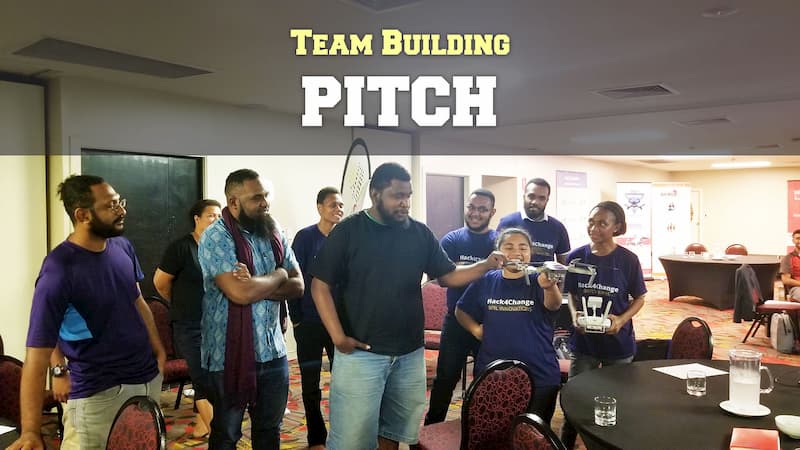 Station 3: PITCH (Value Proposition)
Station 3: PITCH (Value Proposition)
The third and last station is PITCH. Teams identified a specific problem in PNG to be addressed by drones. Next, they identified their business reps to pitch the drone hardware and software's technical capabilities, including improvements in the local supply chain as their value proposition.
The building, flying, and pitching in teams enabled the hackers and their mentors to work collaboratively to effectively communicate, analyze, and build a prototype or complete a flight mission. Key lessons learned were:
- Without a local drone technical support team (build), a drone operation (fly) lacks maintenance and an enabling environment for a safe and successful mission; and
- Without a market for a product or service and a viable business model (pitch), it will be hard to sell.
Fundamentally, it is not about a drone but having a unified system to address a problem leveraging cloud-based technology and AI all working within PNG Civil Aviation and Safety Authority. Thanks to Priscilla Kevin and PNG ICT Cluster for allowing us to promote our team-building activities in this inaugural Hack4Change event. We also thank the CPL Group, which supplied us with a family of mannequins and teamwork T-shirts.
Without the support of each of these groups, this project would not have been as successful. As the proverb goes: Alone we go fast–together we go far.
Category(s)
Recent Articles
View All »
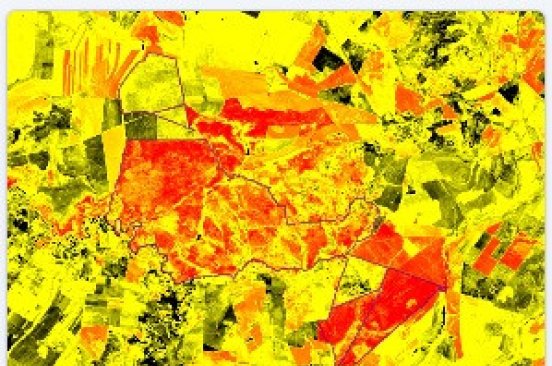
Wildfire Assessment and Web Application in Sao Paulo
